During the lesson, the information for you to know is written in regular type, and what we suggest speaking or reading aloud to children is in bold. All resources for this lesson, including the Teacher Guide, Student Page, Family Connection Card, and other resources can be downloaded in a ZIP file by clicking on the following link:
In some lessons you will find "resource articles." These are articles written by experts from around the world to help equip you for your work with children and adolescents. Share them with parents or guardians if you consider it appropriate.
The Lord appeared to us in the past, saying: “I have loved you with an everlasting love; I have drawn you with unfailing kindness.”
Jeremiah 31:3
Spend a few minutes listing words and phrases that describe God. You can write them down or simply say them out loud. Your list may include that God is loving and powerful. He is Creator, Provider, Father, and King.
God is so many wonderful things, but one description that we do not often think of is that God is kind. In the Bible, the meaning of the word “kindness” is a loyal love that expresses itself more in actions than emotions. It is a strong part of God’s covenant promise with His people. Memorize the verse above and spend time thinking of how God has drawn you to Him with unfailing kindness.
Encourage families to have their own “Acts of Kindness” week. They can surprise each other with small acts of kindness. Examples might include doing a sibling’s chores or giving your mother flowers.
Teacher Tip: If possible, email or text the Family Connection Card to the families of your students.
Welcome the children to your class today. Ask each child to share with another child a way she tried to be a good example to others during the past week.
Today we will talk about kindness. We all like to have kind things done for us or said to us. Often in our world people forget to act and speak kindly.
How would you define kindness in your own words?
Being helpful, friendly, thoughtful, and gentle.
Ask for a volunteer to stand in front of the class.
Let’s play a guessing game. I will whisper an emotion in our volunteer’s ear. He will silently act out that emotion. Everyone else will try to guess what emotion he is showing. After the correct guess, suggest ways someone could show kindness to the person feeling that emotion. For example, if the volunteer acts startled, I could show kindness by apologizing for making a loud noise.
You can choose from this list or come up with your own:
Repeat with a new volunteer and emotion. Continue until 4–5 volunteers have acted out different emotions.
We have learned that God is powerful and strong and loving. Today we will learn that He is also kind. We will hear what the Bible tells us about God’s kindness.
Ask the children to all sit down for the lesson.
Before we hear the story today, let me tell you how the Bible describes kindness. The Bible says kindness is a loyal love that shows itself through actions. It means that God’s love for each person never changes, and He shows it through His actions toward His people. Our actions and words demonstrate to others our own kindness. While anyone can be kind, kindness most often comes from someone who has received kindness from God or others.
Optional: If possible, share the images from The Action Bible.
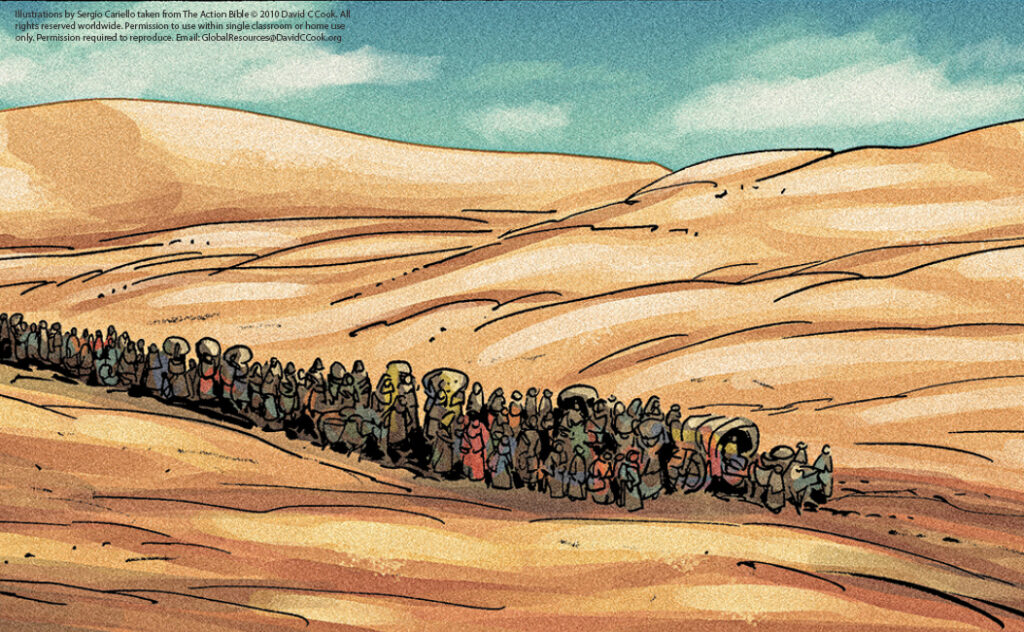
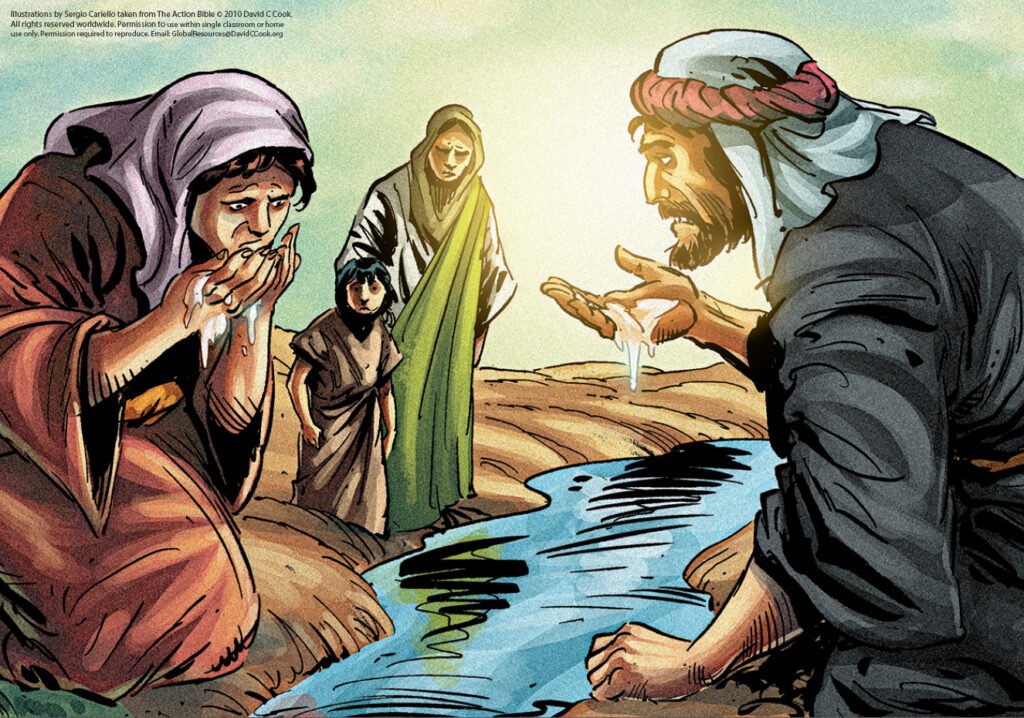
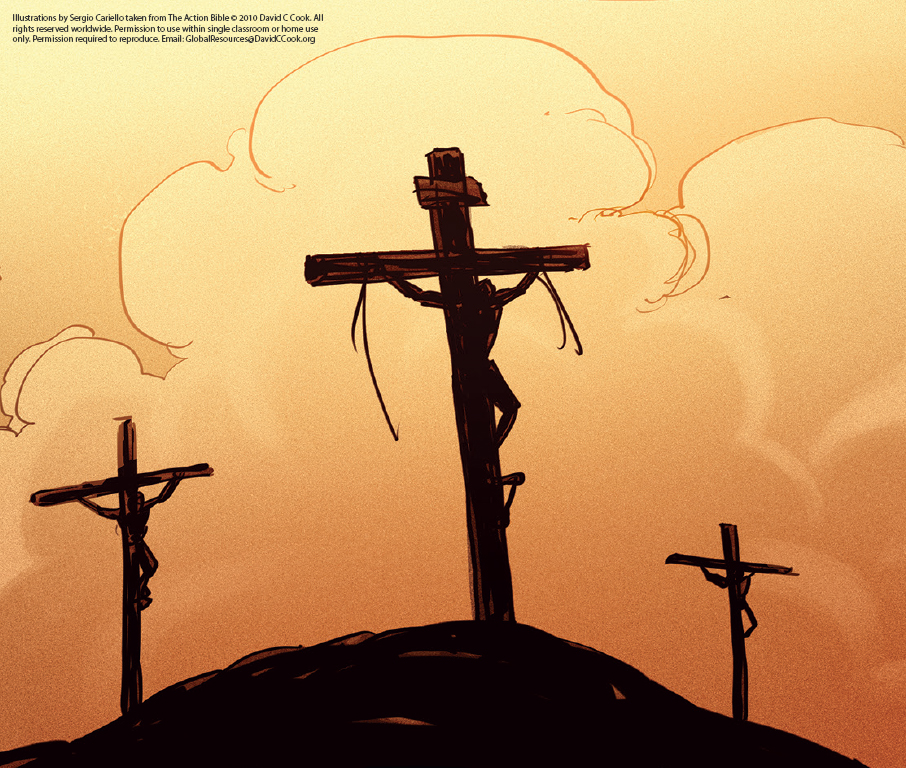
A few weeks ago we learned about a young girl named Miriam. Miriam had a younger brother named Moses.
Can someone tell me what you remember about Moses?
Call on 2–3 children to share what they remember. If they do not remember, explain that God called Moses to lead His people, the Israelites, out of slavery in Egypt.
After Moses led God’s people, the Israelites, out of slavery in Egypt, God showed His kindness to them. The Egyptian army was chasing the Israelites, and God rescued them by parting the Red Sea so they could safely cross to the other side. Yet when the Egyptians tried to cross the sea, the waters came down and they all drowned!
As God’s people walked through the wilderness on the way to their new land, you would think they would be excited and grateful to no longer be slaves. You would think they would be grateful because God had protected them. But they were not!
Instead, the people grumbled. They complained about the journey. They complained about their leaders. They complained about the lack of water. They complained about the lack of food. They said, “We wish we had died in Egypt! We ate all the food we wanted to there. Now we are in the desert where there is no food. We are hungry!”
How do you think God responded to their complaints?
Let’s hear from the Bible how God responded.
Then the Lord said to Moses, “I will rain down bread from heaven for you. The people are to go out each day and gather enough for that day.”
Exodus 16:4
For 40 years God provided bread from heaven, and the Israelites gathered what they needed each morning. They called the bread “manna,” which means “What is it?”
How did God respond to the Israelite’s complaints?
He gave them manna each day to eat.
What does God’s response show us about Him?
He is kind even when the people are ungrateful.
Even when the Israelites complained and grumbled, God acted kindly and provided for their needs. Just as He showed kindness to the Israelites in the desert, He shows His kindness to you and to me. Each of us does wrong things that make God sad. These wrong things are called sin. When we sin, we hurt ourselves and others. But God still loves us and shows His kindness to us! Listen to these verses that tell us about God’s kindness to us.
If possible, read Titus 3:3–7 directly from your Bible. It is also printed here:
At one time we too acted like fools. We didn’t obey God. We were tricked. We were controlled by all kinds of desires and pleasures. We were full of evil. We wanted what belongs to others. People hated us, and we hated one another. But the kindness and love of God our Savior appeared. He saved us. It wasn’t because of the good things we had done. It was because of his mercy. He saved us by washing away our sins. We were born again. The Holy Spirit gave us new life. God poured out the Spirit on us freely. That’s because of what Jesus Christ our Savior has done. His grace made us right with God. So now we have received the hope of eternal life as God’s children.
Titus 3:3–7, NIrV
What are some of the bad things this passage says that we do?
We do not obey God. We are full of evil, letting what we want control us. We want what others have. We hate people.
We are full of all those wrong things. What did God do for us out of kindness for us?
He sent Jesus to save us.
God sent His one and only Son, Jesus, to live on earth as a human just like us. But He lived a perfect, sinless life. We deserve punishment for our sins, but God sent Jesus to take our punishment for us. Jesus died on the cross and was raised to life again so that our sins can be forgiven. Now we can live forever as God’s children when we repent of our wrongdoing. This is the greatest act of kindness anyone has ever done for someone else.
I will ask you 2 questions. After each, shout your answer:
Did God send His Son ,Jesus, to die for our sins because we deserved it?
Lead children in shouting, “No!”
Do we have to do something to earn God’s kindness?
Lead children in shouting, “No!”
God did not show His kindness to us because we deserved it or could earn it. The opposite is true! While we were still sinners, God showed us kindness by sending Jesus to save us.
God’s kindness is meant to lead us to repentance. To repent of sin means to turn away from sin and turn toward God. God’s kindness makes us to want to spend time with Him. His kindness helps us turn away from the sinfulness of doing things our own way. It leads us to toward God and His good ways instead.
Who would you rather spend time with: someone who is mean to you or someone who is kind to you?
We are all drawn toward people who treat us kindly. God shows us the greatest kindness of all when He invites us to be His children! His kindness is intended to draw us to Him. We will take a couple of minutes to respond to God’s kindness toward us.
Quietly think about a time when you did not treat someone kindly. Maybe you said hurtful words, or lied, or cheated, or hurt someone physically.
When you treat others unkindly, you live your own way, not God’s way. Now think about the ways God shows kindness to you. Just as He did with the Israelites, God provides for you. He protects you. He has given Jesus to pay the price for your wrongdoing.
Now we will begin to practice kindness through a kindness project. Imagine that each of us carries an invisible kindness basket. Everyone pretend to hold your basket.
We can choose to keep our kindness basket full by being kind, or we can choose to empty it by being unkind. Giving and receiving kindness fills up our baskets. We need each other to keep our baskets full.
If you have received God’s kindness and are a Christian, He is helping fill your basket so that you can give kindness to others. If you are not yet a Christian, you can still choose to give and receive kindness.
Here is an example of how this kindness project works. If I smile at a neighbour, my kindness basket fills up. My neighbour’s kindness basket also fills up. However, if I hit someone in anger, my kindness basket empties, and the other person’s kindness basket also empties.
Sometimes when we do something kind, the other person may never find out about it. We do not want to be kind because of what others will think. Christians show kindness because they are grateful for the kindness that God has shown them.
For the next few weeks, all of you will keep track of the kind things that you do. At the beginning of each lesson, you will have a chance to share something you did to fill up someone’s kindness basket.
If you are using the Memory Verse Poster, show it to the students.
The Lord appeared to us in the past, saying: “I have loved you with an everlasting love; I have drawn you with unfailing kindness.”
Jeremiah 31:3
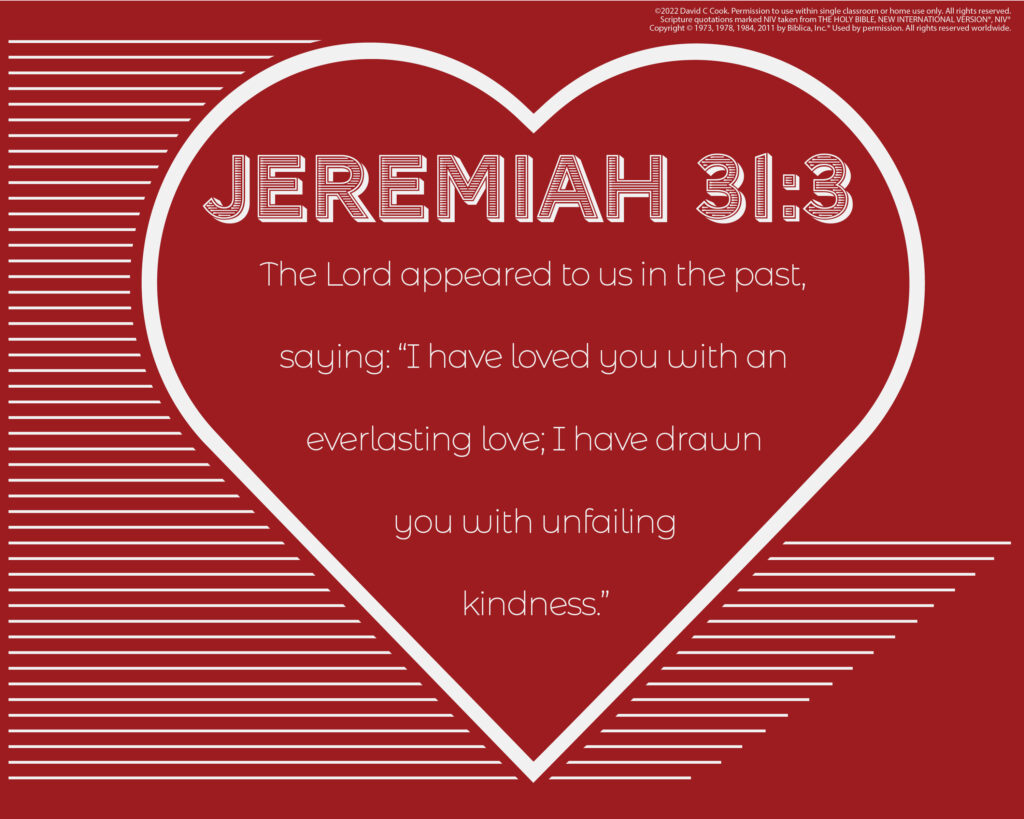
Optional Supplies:
Place a basket, slips of paper, and a pencil in your meeting space. When a child does something kind, encourage him to write it on a slip of paper and place it in the basket. At the end of each lesson, choose 1 or 2 papers from the basket to share with the group. Encourage the children to fill up the kindness basket.
If you are using Student Pages, there is space for children to record kind words and actions on their kindness baskets.
End of Option
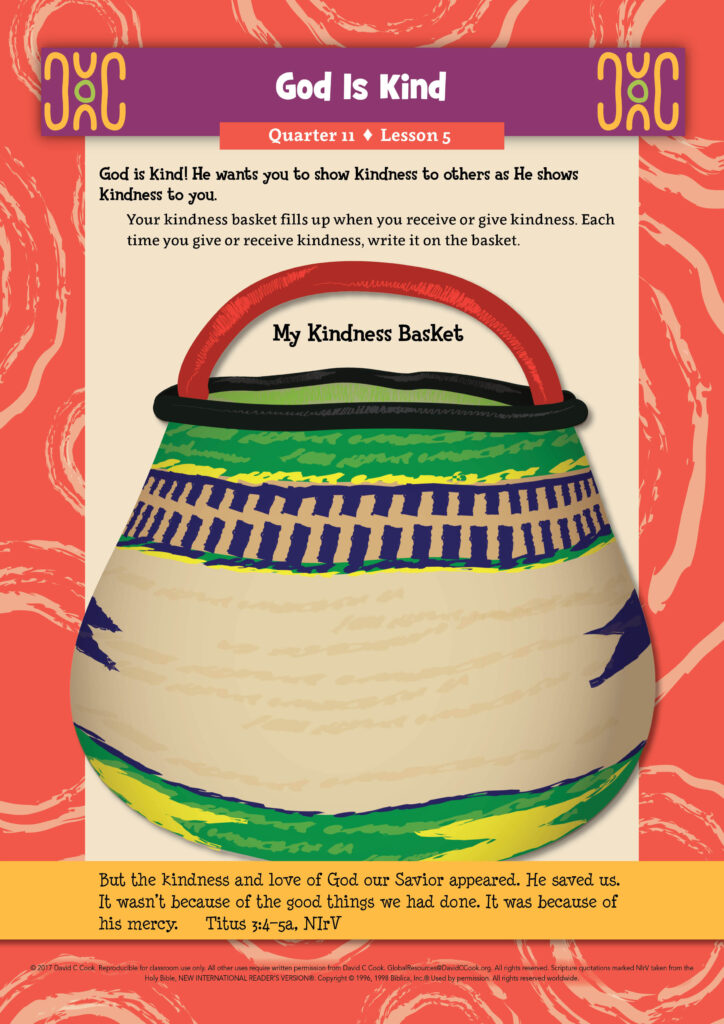
Speak this blessing based on Jeremiah 31:3 over the children.
Blessing: May God’s kindness draw you to Him. May you know that He has loved you with an everlasting love and unfailing kindness. May He fill you so that you can respond to others in kindness.
Lead the children in singing this quarter’s song, if possible.
Life on Life ©2020 David C Cook. Reproducible for home or classroom use only. All other uses require written permission from David C Cook [email protected]. All rights reserved.